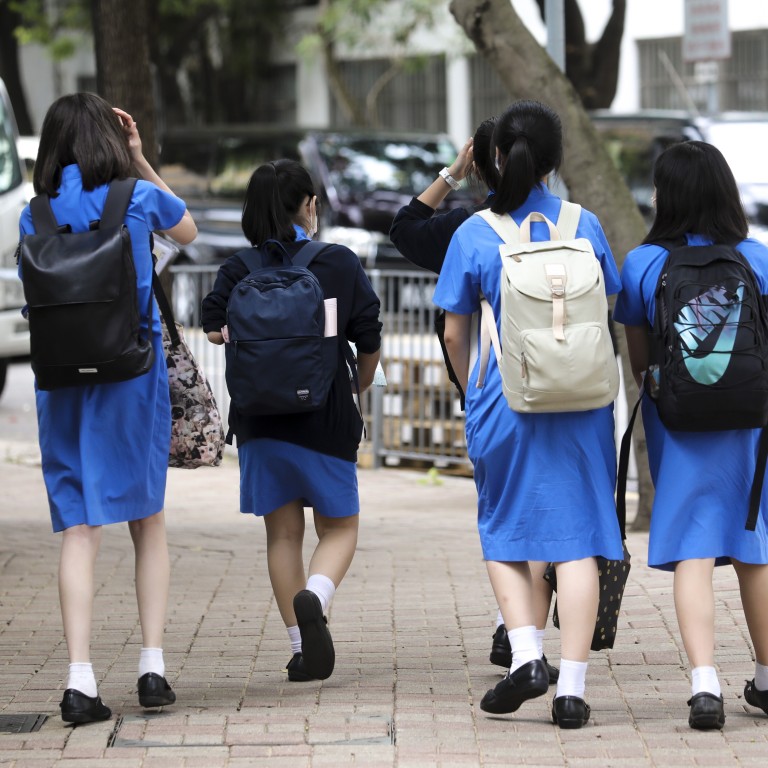
Hong Kong parents and children still have doubts over Covid-19 vaccine, despite government lowering age threshold to 12
- School heads want officials to provide more data to assuage fears over possible vaccine side effects
- Government is considering allowing schools with high vaccination rates to conduct full-day classes
While health experts said it was generally safe for teenagers to be inoculated, school heads urged the government to provide more data to address the concerns of parents and children about possible side effects.
The government, which is expected to announce details of the arrangement to lower the vaccination age limit from 16 to 12 this week, is considering allowing schools with high vaccination rates to conduct full-day classes, instead of just half-day as at present at most schools.
“I believe parents are split on the issue, roughly half of them are positive about their children being able to get vaccinated, but another half are more or less still sitting on the fence,” said Henry Tong Sau-chai, the father of a 15-year-old at a secondary school.

06:18
SCMP Explains: What’s in a Covid-19 vaccine?
Tong, the former chairman of a government advisory committee on home-school cooperation, said he would encourage his daughter to get the jab this month once the details were announced, while noting that many other parents were still worried about possible vaccine side effects.
Clifton Chong, from the concern group Hong Kong Parents League for Education Renovation, which represents about 100 primary and secondary school parents, also said fear of side effects was the main reason parents had adopted a wait-and-see attitude.
“Even if the rate of severe side effects is low … we don’t expect that to be zero, and parents will still have to prepare for the worst,” Chong said.
Antibody tests on arrival could be Hong Kong’s next step in Covid-19 battle
Several secondary school pupils who spoke to the Post on Tuesday echoed that view.
“I don’t plan to immediately take the jab,” a 14-year-old student, surnamed Lau, said. “I would rather be more cautious and observe the situation at other schools first.”
A 15-year-old, surnamed Li, said she was worried about possible side effects and her parents have “also not asked” her to get vaccinated.
A school source said principals raised the concerns of parents and pupils in a meeting with the government on Monday, calling for more relevant data to be made available to alleviate any fears they might have.
Vaccination arrangements were also discussed, the source said, with officials suggesting outreach teams be sent to schools if 300 or more pupils, parents and teachers opted to receive the jab on the same day.
Professor David Hui Shu-cheong, who sits on the government’s vaccine advisory panel, said it was generally safe for young people to take the BioNTech shot, citing data from a study involving 2,260 people aged 12 to 15 published in the New England Journal of Medicine last month with a protection rate of 100 per cent after both doses.
“There is no need to worry,” Hui said, noting that main side effects, such as injection-site pain, fatigue and fever, were common, but the study had not seen any serious adverse events related to the vaccines.
Dr Winnie Tse Wing-yee, president of the Hong Kong College of Paediatricians, also said it was generally safe for young people to get inoculated, because most do not have high blood sugar, high cholesterol and high blood pressure. But those with illnesses such as a cold, flu, or gastroenteritis should wait until they had recovered before getting a shot.
Calls for Hong Kong to tighten rules on residents returning from mainland China
Tse also pointed out that people who have severe food or drug allergies, or those with autoimmune diseases who were taking immunosuppressive drugs, or large doses of steroids, should consult their doctors before taking the jab. However, those with eczema, nasal allergies or asthma who were in stable condition could be vaccinated.
Dr Mike Kwan Yat-wah, a consultant at the department of paediatrics and adolescent medicine at Princess Margaret Hospital, said many children who recovered from Covid-19 had weakened lung function after being discharged. Some also had diminished senses of smell and taste.
He added that some paediatricians were drafting guidelines for children’s vaccination, while the government was also looking into providing consultation services for parents and children.
The take-up rate after the mass vaccination programme was rolled out in late February has been sluggish, with about 15 per cent of the 7.5 million population having already received both doses of either the BioNTech or China-made Sinovac jabs as of Tuesday.
Education authorities revealed last Thursday that about 18 per cent of teachers and staff at some 2,000 kindergartens and schools had been fully vaccinated or were planning to take the first dose, which was slightly lower than the city’s overall vaccination rate.
The Post also asked 10 international schools and three major local school groups last week about their staff vaccination rate, and whether they would encourage pupils to get vaccinated, but only one institution and one school group replied.
A spokeswoman from Hong Kong Academy, which has a student population of about 500 between 3 and 18 years old, said at least 75 per cent of their employees would be receiving their second dose of the vaccine by the end of the academic year.
“Decisions regarding student medical health, including vaccination, will remain within the purview of families,” the spokeswoman said.
Yan Chai Hospital, which runs 11 primary and secondary schools, said they were “observing the details from the government and would take appropriate actions when required”.


